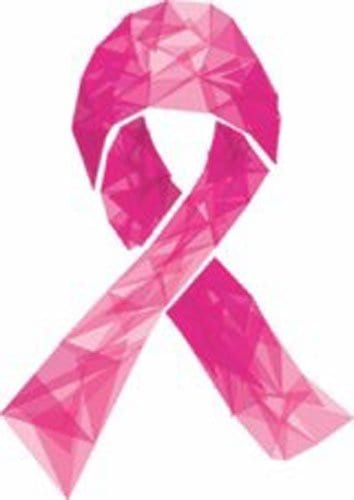![]() Share on TwitterTweet
Share on TwitterTweet
![]() Share on Facebook
Share on Facebook
Blushing for a cause: We’re pink this October in honor of Breast Cancer Awareness Month.
Menopause occurs when a woman’s reproductive cycle is over and she can no longer produce offspring. For many women, menopause occurs around age 50.
While menopause itself is not a risk for breast or other cancers, it’s important to know that some symptom treatments and other factors can increase the risk for cancer among menopausal women.
The North American Menopause Society says that a woman going through perimenopause and menopause may experience various symptoms, which can range from hair loss to food cravings to hot flashes to vaginal dryness. The National Institutes of Health indicates some women undergo combined hormone therapy, also called hormone replacement therapy to help relieve menopausal symptoms such as hot flashes and osteoporosis. This therapy replaces estrogen and progestin, which diminish in a woman’s body after menopause sets in. However, NIH’s Women’s Health Initiative Study has found that women undergoing this therapy have a higher risk of breast cancer, among other conditions.
WebMD says evidence suggests that the longer a woman is exposed to female hormones, whether it’s those made by the body, taken as a drug, or delivered by a patch, the more likely she is to develop breast cancer. That means that hormone replacement therapy can increase breast cancer risk and also indicates that the longer a woman remains fertile the greater her risk for certain cancers. Women who began menstruating before age 12 or entered menopause after age 55 will have had many ovulations. This increases the risk of uterine, breast, and ovarian cancers, states the American Society of Clinical Oncology. It also may impact a woman’s chances of developing endometrial cancer.
Gaining weight after menopause can also increase a woman’s risk of breast cancer, states the MD Anderson Cancer Center. Therefore, maintaining a healthy weight or even losing a little weight can be beneficial.
Women who enter menopause are not necessarily at a higher risk for breast cancer, but some factors tied to menopause can play a role. Women who want to lower their risk for various cancers are urged to eat healthy diets, quit smoking and maintain healthy body weights.
|
|
|
![]() Share on TwitterTweet
Share on TwitterTweet
![]() Share on Facebook
Share on Facebook
Enter your comment below
|
By submitting this comment, you agree to the following terms: You agree that you, and not BrooklynPaper.com or its affiliates, are fully responsible for the content that you post. You agree not to post any abusive, obscene, vulgar, slanderous, hateful, threatening or sexually-oriented material or any material that may violate applicable law; doing so may lead to the removal of your post and to your being permanently banned from posting to the site. You grant to BrooklynPaper.com the royalty-free, irrevocable, perpetual and fully sublicensable license to use, reproduce, modify, adapt, publish, translate, create derivative works from, distribute, perform and display such content in whole or in part world-wide and to incorporate it in other works in any form, media or technology now known or later developed. |
|
This content was originally published here.







